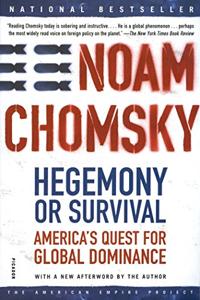
Want to learn the ideas in Hegemony Or Survival better than ever? Read the world’s #1 book summary of Hegemony Or Survival by Noam Chomsky here.
Read a brief 1-Page Summary or watch video summaries curated by our expert team. Note: this book guide is not affiliated with or endorsed by the publisher or author, and we always encourage you to purchase and read the full book.
Video Summaries of Hegemony Or Survival
We’ve scoured the Internet for the very best videos on Hegemony Or Survival, from high-quality videos summaries to interviews or commentary by Noam Chomsky.
1-Page Summary of Hegemony Or Survival
Humanity’s Lifespan
Biologists say that 100,000 years is the estimated lifespan of any species. As humanity approaches that span, it is endangering itself with environmental damage and threats of nuclear war. In fact, declassified documents show that the U.S. and Russia came close to a nuclear confrontation during the 1962 Cuban missile crisis; only reason kept them from firing at each other’s ships.
Yet, in 2003, President George Bush stopped a U.N. effort to ban nuclear weapons in space and the U.S. blocked efforts to negotiate with Iraq, thus ensuring the current invasion. The decision fit into the larger strategy of establishing dominance by using force around the world when necessary; this was stated as policy in 2002’s National Security Strategy report.
Controlling Public Opinion
Politicians often talk about democracy, but they need to control public opinion in order to get their policies passed. Alexander Hamilton saw the public as a “great beast” that needed to be controlled so that elites could run state policy. President Woodrow Wilson put government into the hands of qualified and vetted people from his own class during WWI. The U.S., Britain, and other Western democracies developed propaganda methods during WWII, which were used by Nazi Germany and Soviet Russia.
Eliminating Its Peers
At the core of U.S. foreign policy are two key beliefs: 1) America is the stronghold of righteousness and stability, and 2) it has a right to exercise its power wherever it sees fit. These beliefs have led to many invasions by the United States that have been justified with flimsy evidence or none at all, such as in Iraq. While this may seem like good short-term strategy for the U.S., ignoring international laws has made them less popular globally and less secure overall.
The United States was aggressive toward Cuba in the 60s when Russia placed missiles there, and this aggression continued after the U.S. forced Russia to remove those weapons. At that time, Dean Acheson said international law didn’t matter if another nation threatened U.S. power or prestige; such disregard for international law became more common during both Reagan’s and George H W Bush’s presidencies as well as under George W Bush, who used preventive war against nations that seemed like they might threaten the safety of Americans or have resources or land we wanted to control
Iraq met all of the conditions that Bush set forth for an invasion. The U.S. portrayed Saddam Hussein as a dictator who owned weapons of mass destruction, harbored international criminals and played a role in the September 11 attacks. Bush’s campaign director, Karl Rove, timed the invasion with his re-election bid in mind. However, polls showed that many people thought George Bush was more dangerous than Saddam Hussein to world peace.
Kosovo and East Timor
The United States has undertaken military action without U.N. Security Council approval on two occasions: in 1998, when NATO initiated a bombing campaign to prevent genocide in Kosovo and again in 1999 when the United States invaded East Timor. In both cases, these actions were called “humanitarian interventions.” The reason for this is that Indonesia had been carrying out a genocidal invasion of East Timor since 1975; by 1999, 200,000 people had died as a result of this invasion. After East Timor voted for independence from Indonesia in 1999, the Indonesian government forced hundreds of thousands into exile—and continued to carry out human rights abuses against its own citizens until the U.S.-led intervention began that year.






